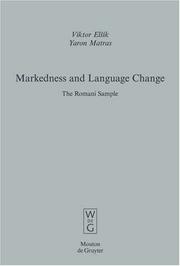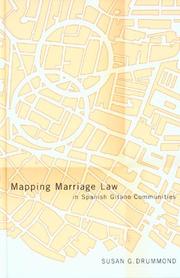| Listing 1 - 2 of 2 |
Sort by
|

ISBN: 3110184524 9783110184525 3110197596 9783110197594 1282193961 9786612193965 Year: 2006 Publisher: Berlin New York Mouton de Gruyter
Abstract | Keywords | Export | Availability | Bookmark
 Loading...
Loading...Choose an application
- Reference Manager
- EndNote
- RefWorks (Direct export to RefWorks)
'Markedness' is a central notion in linguistic theory. This book is the first to provide a comprehensive survey of markedness relations across various grammatical categories, in a sample of closely-related speech varieties. It is based on a sample of over 100 dialects of Romani, collected and processed via the Romani Morpho-Syntax (RMS) Database - a comparative grammatical outline in electronic form, constructed by the authors between 2000-2004. Romani dialects provide an exciting sample of language change phenomena: they are oral languages, which have been separated and dispersed from some six centuries, and are strongly shaped by the influence of diverse contact languages. The book takes a typological approach to markedness, viewing it as a hierarchy among values that is conditioned by conceptual and cognitive universals. But it introduces a functional-pragmatic notion of markedness, as a grammaticalised strategy employed in order to priositise information. In what is referred to as 'dynamic', such prioritisation is influenced by an interplay of factors: the values within a category and the conceptual notions that they represent, the grammatical structure onto which the category values are mapped, and the kind of strategy that is applied in order to prioritise certain value. Consequently, the book contains a thorough survey of some 20 categories (e.g Person, Number, Gender, and so on) and their formal representation in various grammatical structures across the sample. The various accepted criteria for markedness (e.g. Complexity, Differentiation, Erosion, and so on) are examined systematically in relation to the values of each and every category, for each relevant structure. The outcome is a novel picture of how different markedness criteria may cluster for certain categories, giving a concrete reality to the hitherto rather vague notion of markedness. Borrowing and its relation to markedness is also examined, offering new insights into the motivations behind contact-induced change.
Markedness (Linguistics) --- Romani language --- Gypsy language --- Romany language --- Rommany language --- Indo-Aryan languages, Modern --- Romanies --- Marked member (Linguistics) --- Distinctive features (Linguistics) --- Generative grammar --- Grammar, Comparative and general --- Linguistics --- Dialects --- Markedness --- Languages --- Markedness. --- Dialects. --- Language Change. --- Romani language.

ISBN: 9786612740893 0774853832 128274089X 0774809256 9780774809252 9780774809269 0774809264 9780774853835 6612740892 9781282740891 0774809264 Year: 2006 Publisher: Vancouver [B.C.] UBC Press
Abstract | Keywords | Export | Availability | Bookmark
 Loading...
Loading...Choose an application
- Reference Manager
- EndNote
- RefWorks (Direct export to RefWorks)
Comparative law and legal anthropology have traditionally restricted themselves to their own fields of inquiry. Mapping Marriage Law in Spanish Gitano Communities turns this tendency on its head and investigates what happens when the voices of each discipline are invited to speak to each other. Susan Drummond forges this hybrid form of comparative work through small- and large-scale studies of Gitano marriage law as it emerges in a Western European state, in a modern urban centre, and in particular communities and families. Drummond's mapping of Gitano marriage law is grounded in ethnographic fieldwork in Andalucia. The study draws initially from the tradition of comparative law to focus on the emergence of Spanish state family law in a predominantly national and international context. Drummond then adopts the role of legal anthropologist to examine a particular legal culture that exists within, and also beyond, the Spanish state: that of the Gitanos and the transnational Roma. Ultimately, she brings the international, national, and cultural dimensions of law into play with one another and contemplates how all of these influences bear on the spirit of Andalusian Gitano marriage law. The result is an ethos of marriage law in a thoroughly mixed legal jurisdiction. Mapping Marriage Law in Spanish Gitano Communities will appeal to scholars and students in comparative law and legal anthropology, as well as readers interested in Roma studies in general, and the Gitanos in particular.
Marriage law --- Law, Romani. --- Romanies --- Domestic relations --- Law and anthropology. --- Anthropology --- Ethnological jurisprudence --- Bohemians (Romanies) --- Gipsies --- Gitanos --- Gypsies --- Kalderash --- Manush --- Roma (People) --- Romani --- Sinti --- Nomads --- Law, Gypsy --- Romani law --- Romaniya --- Legal status, laws, etc. --- Andalusia (Spain) --- Social life and customs. --- Anthropology and law
| Listing 1 - 2 of 2 |
Sort by
|

 Search
Search Feedback
Feedback About UniCat
About UniCat  Help
Help News
News